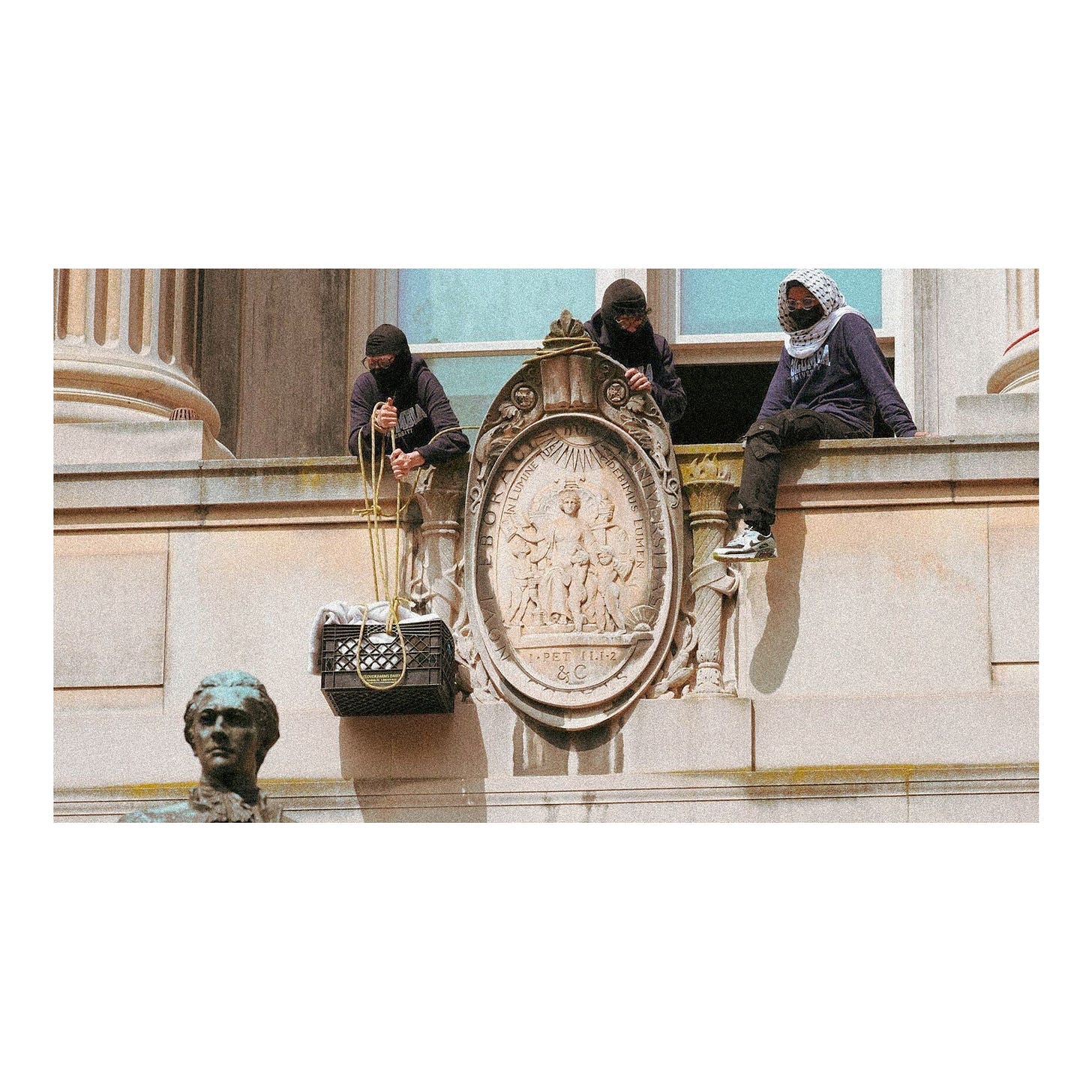Hello from Inhabit. A lot has happened since our last issue. One month ago, students occupied the main quad at Columbia University, setting off the ongoing international wave of campus occupations and threatening a political crisis for the Biden administration. Two weeks later, a dedicated crew took Hamilton Hall before being brutally repressed by the NYPD. Meanwhile, other friends in Southern Illinois have decided to put their lives in common at “The Commune,” offering yet another beautiful example earthbound resistance to the end of the world. Four months ago, French farmers dumped manure on the front steps of city halls in protest against free trade policies and skyrocketing agricultural costs in Paris and Toulouse.
Each of these efforts models the essential link between place, partisanship, and dignity in a world on fire, and so we offer these features to you in honor of them.
The world tilts and fragments. Whatever it takes, keep going.
Dispatch from the People’s University (aka Columbia University)
This dispatch was submitted anonymously to the Territories collective on the eve of the occupation of Hamilton Hall.
First we seize the lawns from the clutches of empire, these are no longer imperial spoils for the bohemian gentry but a staging area for a new world to come. Our comrades on the outside demand that we tear down the gates and the youth inside are transforming, preparing for the flood to come.
A girl stood up in the general assembly and said “this commune belongs to the people of Harlem!” After the reclamation of the lawns, she is preparing for the flood to come.
Th commune changes people, I tell my comrade.
First we seize the lawns and then we seize our humanity and then we seize the means of knowledge production and the gates fly open and the people’s commune of Harlem spreads across the whole world.
The Left, Progress, and the Peasant
A brief history and analysis of a recent farmers uprising in France.
There are few subjects the various ideologies of modernization agree more on: working the land is a kind of bondage, a thankless task that weighs on the individual, confining him to his plot of land and the shadows of the pre-enlightened world. As it turned out, the technical and economic needs of the luminous modern world were leading the planet to its doom, and in the meantime creating a class of wage-earning consumers with a dull, repetitive existence, probably not that different from that of the workers of yesteryear–the kind of same dependence, only with gadgets and processed food. The modern farmer found his own new form of bondage in agro-industrial techniques.
Building the Commune in Carbondale, IL
Some friends down south come together for a queer life in common.
All of the states around us are increasingly becoming hostile to queer life and joy. We know queer life, joy, and struggle will continue in these places and they must, but as states pass more and more evil laws it will be harder for many trans people to live there. The threat of violence against our visible queer lives will grow with each law passed and each speech given that calls for our eradication. There are many young people trapped in awful, homophobic families that suppress and attack their ability to be free. Cities and spaces need to be pried away from capital and empire in order to make room for safety and security for queers, but also to create places for queer life and love to flourish. We need places where Queerness is synonymous with dangerousness. Places where queer life is defended tooth and nail, but also where queerness grounds attack against that which kills queer life.
“Then as now, it will take the opening of new fronts and the spread of increasingly disruptive tactics, such as building occupations, to pull the emergency brake on the war machine.” Anonymous authors from the Columbia occupation on how to win.
“What unites all radical milieus today is their structural need for people of color to be unfree.” Athena on militancy and whiteness.
“We have to end the dictatorship of capital; the lives of humans, animals, and ecosystems depend on it.” Victor Cartan on the legacies of Bookchin and Lordon.
“People are casting off old ways and recognizing that everything depends on us rising to the challenges of our times.” Michelle Alexander on revolutionary love.
“What communities and politics are cultivated when we share knowledge about the making and maintenance of our material worlds?” Shannon Mattern on the repair manual.
“The advertising technology ecosystem is the largest information-gathering enterprise ever conceived by man.” Byron Tau on government surveillance and online ads.
“Each drone unit on the battlefield serves as a sort of test lab for new technologies, procurement, and combat missions.” Thomas Gibbons-Neff & Yurii Shyvala on drone warfare in Ukraine.
“For as long as we’ve been human, we have looked to the sky to find ourselves.” Caia Hagel & Tim Georgeson on the dark sky movement.
“The problem with water and climate change is that there’s either too much of it, all of a sudden, or there’s too little.” Oana Filip & Liviu Chelcea on the changing politics of water consumption.
“We’re stuck in futures of environmental collapse and corporate domination because they remain our most likely real-world future.” Michael Harris on the cultural ubiquity of dystopias.
“The possibility of a nuclear strike, once inconceivable in modern conflict, is more likely now than at any other time since the Cold War.” W.J. Hennigan on the return of the nuclear threat.
This text has been syndicated from Inhabit: Territories.

